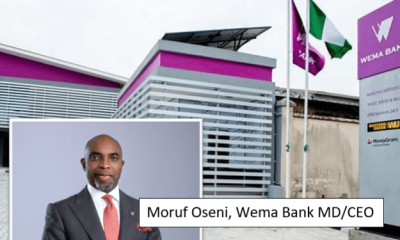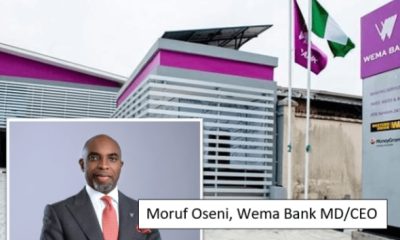Business
The Rise of Impact Investing: Wema Bank Green & Gender Financing Drive in Focus

The Rise of Impact Investing: Wema Bank Green & Gender Financing Drive in Focus
The deployment of funds into investments that generate a measurable and beneficial social or environmental impact, along with a financial return on investment (UNDP).
The term ‘Impact Investing’ has gained increasing recognition in recent years across regional and global spheres and sectors.
Following growing awareness of the limitations of corporate social responsibility (CSR) activities in addressing societal and economic concerns, thought leaders and drivers of sustainability across sectors, industries and nationalities have shifted the focus to creating better avenues for measurable, positive socio-economic impact.
Impact investing relates to the more measurable initiatives, policies and procedures set in place to provide long-term solutions to the socio-economic inequalities that affect modern societies and economies. This is further exemplified by the imposition of new criteria for measuring the effectiveness of social and sustainability initiatives across all areas of materiality towards the overarching need for the achievement of the Sustainable Development Goals by 2030.
Renewable energy and gender financing are two major focus areas of the impact investing movement with the global Net-Zero Emissions commitments signed on by over 140 countries to achieve carbon neutrality and the Gender 2x Challenge commissioned by the G7 summit in 2018 as a bold commitment to encourage financial and development finance institutions and the broader private sector in women across the world. These two areas have specific goals of preserving climate energy levels below 1.50C and bridging the gender equality gap respectively.
Wema Bank, a leading organization in the Nigerian sustainability space, is not behind the times with respect to the impact investment agenda with a focus on innovative financing and catalytic funding.
As far back as 2018, the Bank expanded its socio-economic focus beyond the limited scope of Corporate Social Responsibility (CSR) and adopted the Corporate Social Investment (CSI) policy as the strategy for achieving the sustainability vision of providing solutions for societal impact.
All social impact initiatives championed by the Bank cut across five core Corporate Social Investment pillars namely; Economic Empowerment, Education, Environment, Finance & Health. Over 500,000 beneficiaries across the nation have been impacted so far.
In keeping with the rise of impact investing especially along the global Green Energy and Gender Financing focus areas, Wema Bank has the following initiatives targeted at both areas of materiality:
Green Finance Facility – There is a general understanding by the leadership of the Bank that financing choices tie directly to the necessary transition to a greener and more sustainable economy. In pursuit of the drive to build climate resilience through the financing of adaptation measures, the Bank launched a Green Energy Finance Facility to enable SMEs and individuals reduce their emissions through power generation. The facility provides opportunities for SMEs to access up to N10million for renewable energy solutions in their business operations and processes.
Sustainable Finance – Wema Bank is committed to the systemic reduction of financed emissions through reduced lending to high climate risk sectors and promoting investment in more sustainable segments of the economy such as renewable energy, waste management, gender finance, smart agriculture amongst others. About N50billion has been invested in sustainable businesses so far with enhanced incentives for the adoption of sustainable business practices promoted through outlets such as the Vendors Environmental & Social Forum, SME Business School, webinars and bankwide sustainability training courses amongst others.
SARA by Wema: The Bank’s proposition for women was established to provide gender-targeted solutions across the workplace, community and marketplace segments. In response to the AfDB report of a $42billion gender financing gap and the World Economic Forum estimate of 136 years to bridge the gender equality gap, SARA by Wema has led diverse empowerment initiatives to promote gender finance. In alignment with the Gender 2x Challenge commitment to promoting women-owned/women-led businesses, Wema Bank has provided over N58.9billion uncollaterized loans to women MSMEs across the nation through the SARA proposition. This is a direct solution provided by the Bank to the access to finance problem and lack of collateral for accessing loans highlighted as some of the major obstacles encountered by women businesses.
Over 45,000 women have also benefitted from the diverse access to market programs such as online and physical trade fairs. SARA by Wema also champions training programs and seminars as well as skill acquisition workshops to promote business growth and entrepreneurial success for women businesses.
This is further bolstered by the provision of business startup kits and grants for over 30,000 women in the Nigerian SME sector.
UN-WEP Commitment: In November 2021, Wema Bank committed to the United Nations Women Empowerment Principles targeted at offering guidance on how to empower women in the workplace, marketplace and community. Since adoption of the 7 principles, diverse initiatives and policies have been implemented to promote the work towards the achievement of Sustainable Development Goal 5 – Gender Equality. A clear example of the foregoing is reflected in the update to the Bank’s procurement strategy to provide priority to female-owned businesses on the Bank’s supply chain in alignment with UN-WEP principle 5 – Enterprise Development, Supply Chain & Marketing Practices. The Bank has also introduced vendor categorization and tracking for seamless onboarding processes to ensure even more female representation on the supply chain.
Gender financing and the need for sustainable business practices are also emphasized for all the Bank’s vendors and suppliers at the annual Vendors Environmental and Social Forum.
In further alignment with the United Nations Women Empowerment Principles – Principle 1 – Establish High-level Corporate Leadership for Gender Equality, the Bank appointed its first female Chairperson – Dr. Oluwayemisi Olorunshola – in June 2023.
This is yet another bold step in the Bank’s path to the achievement of gender equality and equity. Women empowerment in the workplace is also promoted through the Wema Women Network – the internal structure for female employees across all cadres and levels within the Bank.
The Wema Women Network charter objective of empowering Wema women to become achievers in their career and personal lives is continually driven through growth and development initiatives such as quarterly connect sessions and workshops, mentorship opportunities through the internal Big Sister Program, career development and etiquette trainings, fitness programs amongst others.
Youth Empowerment: Youths form the majority of the Nigerian population with 70% under the age of 30. They also constitute the primary drivers of digital innovation and other socio-economic and environmental solutions targeted at specific societal issues. This is further evidenced by the impressive volume of fintechs, ed-techs, health-techs and other solutions making a significant impact across the nation and African continent.
Wema Bank is deliberate about promoting youth innovation and empowerment and has consistently led the drive starting with the launch of ALAT – Africa’s first digital banking platform with over 2.1 million active customers transacting daily. Not an institution to rest on its oars, Wema Bank also launched the ALAT x FGN partnership in 2023. In partnership with the Federal Government of Nigeria, Wema Bank launched the Digital Skillnovation Program for MSMEs through which digital hubs will be established in 15 states across the country as innovation centers equipped with advanced technology for optimal impact.
The Bank’s youth empowerment drive also continues with a partnership with the Small and Medium Enterprise Development Agency (SMEDAN) for capacity-building exercises on solar installation and sustainable entrepreneurship for Nigerian MSMEs. These Solar Powered Hubs include locations across all regions in the country to promote solar power transition and adoption as part of efforts towards achieving the national 2060 net-zero emissions target.
The above and many more provide proof of Wema Bank’s immense contribution and participation in the global drive for promoting impact investing. Impact investing is the way to go in ensuring sustainable finance and providing a positive impact across the environmental, social, economic and governance pillars of sustainability.
As the world draws closer to the 2030 Agenda timeline, it is important, now more than ever, for all players to get on board in shedding the traditional financing measures causing more harm than good and promote the triple bottom line – People, Planet and Prosperity through impact investing and sustainable finance.
Impact investing provides a business unusual approach to solving socioeconomic and ecological problems and ensures the positive impact is driven to the last mile. In this aspect, Wema Bank’s commitment to empowering lives through innovation and providing solutions for societal impact continues to ring true.
Towards the establishment of a better world, Wema Bank is a stellar example of a business that seeks to do well by doing good through the creation of useful solutions to meet the dynamic needs of the populace with Initiatives centred on social equity and diversity, empowerment, hybrid working models and sustainable business practices.
Business
Access Holdings embarks on N351 billion rights issue to strengthen capital base

Access Holdings embarks on N351 billion rights issue to strengthen capital base
Access Holdings Plc has held a formal signing ceremony as part of the arrangements to raise a total of N351 billion by way of a rights issue to existing shareholders.
The offer is part of the group’s strategy to enhance its working capital requirements, which includes organic growth funding for its banking and non-banking subsidiaries.
Subject to approval by the SEC
According to the group in a statement, subject to the approval of the Securities and Exchange Commission (SEC), the acceptance and application lists for the rights issue are expected to open on Monday, July 8, 2024, and close on Thursday, August 8, 2024.
Access Holdings’ shareholders had at its 2nd Annual General Meeting (AGM), which was held on Friday, April 19, 2024, backed its plan to execute a Capital Raising Programme of about $1.5 billion as well as the subset initiative to raise capital through a rights issue of ordinary shares to its shareholders.
The Group stated that, under the Rights Issue, 17.772 billion ordinary shares with a nominal value of N0.50 each will be offered at N19.75 per share, on the basis of one new ordinary share for every two existing ordinary shares held as of Friday, June 7, 2024.
2023-2027 strategic plan
At the Signing Ceremony, Acting Managing Director/Chief Executive Officer of Access Holdings Plc, Bolaji Agbede, disclosed that “The Rights Issue is a significant step in delivering our 2023-2027 strategic plan. The additional capital will enable us to maximise emerging opportunities and deliver long-term value to our shareholders.”
Agbede disclosed that Chapel Hill Denham is the Lead Issuing House to the Offer, while Atlas Registrars Limited will serve as Registrars through the exercise.
“The Joint Issuing Houses are Coronation Merchant Bank, Stanbic IBTC Capital, Vetiva Advisory Services, Greenwich Merchant Bank, FCSL, First Ally Capital, FCMB Capital, Renaissance Capital Africa and Meristem Capital,” he said.
Other parties to the Offer according to him are Coronation Merchant Bank, Coronation Securities, Chapel Hill Denham Securities Limited, FSDH Capital, Cordros Capital, Cowry Securities, First Integrated Capital Management Ltd, Network Capital Ltd, CSL Stockbrokers Limited, Compass Investment & Securities Ltd, PAC Securities Limited, Dynamic Portfolio, Chartwell Securities Limited, Tiddo Securities Limited, and Futureview Securities Limited.
He noted that the Rights Circular for the Issue, which contains a Provisional Allotment Letter and the Participation Form, will be mailed directly to shareholders of the Group. Printed copies of the Participation Form can also be obtained at any Access Bank branch and the offices of the Issuing Houses during the Offer Application Period.
“All existing shareholders and prospective investors are encouraged to read the Rights Circular and Prospectus and, where in doubt, consult their Stockbroker, Fund/Portfolio Manager, Accountant, Banker, Solicitor, or any other professional adviser for guidance before subscribing,” he said.
Business
Reasons Investors Might Purchase Fidelity Bank’s Offerings, as Identified by Capital Market Stakeholders

Reasons Investors Might Purchase Fidelity Bank’s Offerings, as Identified by Capital Market Stakeholders
Fidelity Bank Plc started its N127.1 billion combined rights and public offers to a rousing support from the investing public as key capital market stakeholders recalled the symbolic importance of Fidelity Banks impressive growths and investor-friendly disposition over the years.
From the Nigerian Exchange (NGX) to stockbrokers, investors and customers; the N127.1 billion combined rights and public offer received unreserved recommendations, with industry thought leaders citing the performance of Fidelity Bank in its core banking operations and as a quoted company at the stock market.
They said Fidelity Banks N127.1 billion combined rights and public offer was the right way for the nations banking recapitalisation exercise to start as the bank, which has the highest corporate governance rating and an average annual capital gain of more than 100 per cent at the stock market, has strong appeal to the investing public.
Fidelity Bank is offering a rights issue of 3.2 billion ordinary shares of 50 kobo each at N9.25 per share.
The bank is also simultaneously offering 10 billion ordinary shares of 50 kobo each to the general investing public at N9.75 per share.
The acceptance and application lists for the rights issue and public offer, which opened on Thursday, June 20, 2024, are scheduled to close on Monday, July 29, 2024.
The rights issue has been pre-allotted on the basis of one new ordinary share for every 10 existing ordinary shares held as at the close of business on Friday, January 05, 2024.
The Doyen of Stockbrokers, the oldest practicing stockbroker, Alhaji Rasheed Yussuff, said Fidelity Bank has good records going for it with its history of impressive growth and profitability and dividend payments.
According to him, the bank is known to the market as a good investment, with evident records of impressive returns and corporate responsibility.
Yussuff, who was already a leading stockbroker and managing director of Trust Yields Securities Limited in 2004-2005 when Fidelity Bank launched its initial public offering (IPO) and listed its shares at the stock market, said the bank has been hitting all positive records that should encourage investors to buy more into it.
Referencing the banks impressive returns, Yussuff, who has more than five decades in the capital market and was principal dealing clerk for ICON Limited/ICON Stockbrokers in 1976, particularly noted that Fidelity Bank has been paying good dividends.
Chairman, Association of Securities Dealing Houses of Nigeria (ASHON), Mr Sam Onukwue, who recalled the founding days of Fidelity Bank in 1987, said he had watched Fidelity Bank sustained commendable growth trajectory over the years.
He said the bank has shown exceptional growth and resilience, rising from being a private merchant in 1987 to becoming one of the largest, publicly quoted commercial banks in Nigeria. Fidelity Bank is one of the seven Nigerian banks with international banking licences.
Onukwue, who is also managing director of Mega Equities Limited, said Fidelity Banks history of performance underlines the strength of its management, noting that the bank has proven to be able to keep investors trust.
Chairman, Nigerian Exchange (NGX), Mr. Ahonsi Unuigbe said the combined offer marked a pivotal moment for the bank and the financial services sector.
This is a testament to Fidelity Banks unwavering commitment to strengthening its own capital base and ensuring sustainable growth through amazing roles played by all of the professional parties to this transaction,
Unuigbe, an investment banker and former director at Standard Bank, said.
He said the new banking recapitalisation is aimed at bolstering the resilience and stability of the nations financial institutions.
According to him, the ongoing recapitalisation has set robust minimum capital requirements that will ensure Nigerian banks are not only more solvent, but also capable of supporting the growth and development of the economy.
Acting Chief Executive Officer, Nigerian Exchange (NGX), Mr. Jude Chiemeka, commended Fidelity Bank for its performance and willingness to avail the investing public of every relevant information.
He assured that the NGX remains committed to supporting companies like Fidelity Bank in its quests to deepen the capital markets and fostering an environment conducive to sustainable growth and innovation.
Founder, KAM Holding, Dr Kamoru Yusuf, said Fidelity Bank has shown to be an exceptional bank with focus on the development of Nigerian economy and companies.
He said investing in Fidelity Bank will be an investment in the growth of Nigerian economy and companies like KAM Holding, the nations largest wholly indigenous metal and steel production company.
Yusuf, whose group has metamorphosed into a global business conglomerate operating in three countries across two continents, confirmed that KAM Holding has benefited immensely from financial supports from Fidelity Bank.
Yusuf, who was physically present at a session at the NGX to present facts behind the offer to the investing public, underlined the relationship between increased capital for a business-focussed bank like Fidelity Bank and the overall development of the Nigerian economy.
Addressing the investing public at the NGX, Managing Director, Fidelity Bank Plc, Dr Nneka Onyeali-Ikpe, reiterated the commitment of the bank to delivering impressive returns to shareholders and supporting the growth of the Nigerian economy.
She explained that the new capital raising by Fidelity Bank was driven by its proactive business expansion plan having secured shareholders approval to raise new equity funds as early as August 2023.
The Central Bank of Nigeria (CBN)s directive on new minimum capital was released in March 2024.
The offer will increase our capacity to support our customers and their businesses.
In summary, this capital raise will help our customers to grow, their businesses to thrive, and their economy to prosper, Onyeali-Ikpe said.
She assured that with its groundswell of supports from enthusiastic shareholders, customers and stakeholders, the bank is on course to achieving the N500 billion new minimum capital base, which will clearly confirm the bank, beyond any doubt, as one of the biggest banks in Nigeria.
Onyeali-Ikpe noted that being the first bank to launch offer out of the many banks in Nigeria after the CBN directive,
Fidelity Bank has shown again to be a pace-setter.
According to her, Fidelity Bank seeks the CBN recapitalization directive as a significant opportunity for a stronger and more resilient banking industry.
We have embraced the challenge as a catalyst to propel us, towards a long-term vision of becoming a market leader across every product that we offer and segment that we sell, not just in Nigeria, but as an international bank, Onyeali-Ikpe said.
She said the proceeds from the N127.10 billion capital raising exercise would be instrumental in achieving its strategic growth plan.
She highlighted that the funds, firstly, would be deployed to drive, business growth and regional expansion.
We will strategically expand our footprints within and outside Nigeria to serve as a broader customer base and to unlock new market opportunities.
Secondly, we will have what we call technological transformation. We are committed to leveraging proprietary technology to improve operational efficiency and deliver exceptional customer service.
Thirdly, we intend to diversify and grow. By investing in information technology (IT) infrastructure and product distribution channels, we will aim to diversify our earnings base through digitalization and business expansion, Onyeali-Ikpe said.
She said the management recognised the importance of investors and are committed to delivering value to them as well.
Our track record of accelerated growth and consistent dividend payment is a testament to this, Onyeali-Ikpe said.
A recent review had shown that Fidelity Bank outperformed all major market indices for measuring returns at the Nigerian stock market, with the banks average annual return over the past five years twice the average return by the overall market and almost four times of average return in the banking sector.
A review of official trading reports at the Nigerian stock market showed that investors in Fidelity Bank have earned more than 507 per cent in capital gains over the past five years, between May 31, 2019 and May 31, 2024
Fidelity Banks share price rose by 507.14 per cent over the period, representing average annual capital gain of 101.43 per cent.
This significantly exceeds all other major return benchmarks, including the banking sector.
With 507 per cent capital gain in five years and average annual gain of more than 100 per cent, the return analysis implies that investment in Fidelity Bank is more attractive than other class of assets, including fixed-income securities such as government and corporate bonds; real estate investment and mutual funds among others.
These returns underscore Fidelity Banks immense value as a stock for all times, helping investors to hedge against inflation while preserving significant long-term value.
The high divisible nature of shares investment and high free float of Fidelity Bank, which makes the banks shares easily available, underline the bank as a most attractive investment option for all cadres of investors- small, medium and high networth; retail and institutional investors.
The All Share Index (ASI) – the common, value-based index that tracks all share prices at the Nigerian Exchange (NGX), which is widely regarded as Nigerias benchmark for equities market, recorded a five-year return of 219.61 per cent, an average annual return of 43.9 per cent.
Contrary to the significantly above average performance of Fidelity Bank, the NGX Banking Index-which tracks the banking sector, doubled by 120.53 per cent over the five-year period, representing average annual return of 24.11 per cent, more than 77 percentage points below Fidelity Banks average return.
Two other major price indices- the NGX 30 Index and NGX Main Board Index, recorded five-year cumulative return of 185.73 per cent and 265.6 per cent respectively, representing average annual gain of 37.15 per cent and 53.1 per cent respectively.
The NGX 30 Index tracks share prices of the 30 largest companies at the stock market while the NGX Main Board Index represents the largest and most diversified group of listed companies at the stock exchange.
Fidelity Bank is quoted on the main board, like most other major banks and companies at the stock market.
The average annual return of 101.43 per cent underlines that Fidelity Bank provides substantial return for investors, even where such investors had borrowed money at the ruling interest rate and the invested fund was adjusted for impact of inflation rate.
Nigerias inflation rate peaked at a high of 33.69 per cent in April 2024 while the Central Bank of Nigeria (CBN)s Monetary Policy Committee (MPC) recently increased the Monetary Policy Rate (MPR), otherwise known as benchmark interest rate, to 26.25 per cent.
Fidelity Banks share price, which closed May 31, 2019 at N1.68 per share, rose successively to N10.20 per share by the end of May 2024.
The ASI had, during the period, rose from its opening index of 31,069.37 points to close weekend at 99,300.38 points. The NGX Banking Index rose from 361.57 points to 797.37 points.
The NGX 30 Index, which opened the period at 1,286.68 points, closed the period at 3,676.44 points.
The NGX Main Board Index appreciated from 1,267.54 points to close weekend at 4,634.31 points.
Business
GTCO Recognized as Nigeria’s Leading Banking Brand

GTCO Recognized as Nigeria’s Leading Banking Brand
Africa’s leading financial services institution, Guaranty Trust Holding Company Plc (“GTCO” or “the Group”), has added to its impressive haul of accolades as it was recently named Nigeria’s strongest brand and Best Banking Brand in Nigeria by Brand Finance and Global Brands Magazine, respectively.
These awards not only reaffirm GTCO’s position as a leading financial services group but also spotlight the Group’s enduring reputation as a customer-focused brand.
Over the years, GTCO has demonstrated remarkable commitment to shaping the future of financial services in Africa and is renowned for its innovative approach to customer service and stakeholder engagement.
The Group’s brand strength is underpinned by a strong commitment to delivering cutting-edge financial solutions, fostering meaningful customer relationships, and Promoting Enterprise using its proprietary free business platforms.
Commenting on the two awards, the Group Chief Executive Officer of Guaranty Trust Holding Company Plc, Segun Agbaje, said:
“These achievements are a reflection of our unwavering commitment to excellence, innovation, and customer satisfaction, as well as to building a truly international brand from our proudly African roots. We are delighted to receive these recognitions and inspired to continue delivering our promise of enriching lives with every opportunity.”
GTCO is a leading financial services group with banking operations in Nigeria, West Africa, East Africa, and the United Kingdom alongside non-banking verticals in HabariPay, Guaranty Trust Fund Managers, and Guaranty Trust Pension Managers.
Its leadership in the banking industry and efforts at empowering people and communities has earned it many prestigious awards over the years.
The Group’s flagship banking franchise, Guaranty Trust Bank, was named Nigeria’s Best Bank and Best Bank in CSR at the 2023 Euromoney Awards for Excellence, Best Banking Group in Nigeria by World Finance, and Best Bank in Nigeria by Global Finance.
Guaranty Trust Bank is featured in the Top 1000 Banks in the World and Top 100 Banks in Africa rankings by The Banker.
-

 News2 years ago
News2 years agoWhat Led Us To Choose Peter Obi As Our Candidate?-Middlebelt Forum
-

 BREAKING NEWS10 months ago
BREAKING NEWS10 months agoKey Insights for the Upcoming 2023/2024 UEFA Champions League Campaign
-

 Entertainment8 months ago
Entertainment8 months agoTaylor Swift Skips Travis Kelce’s Big Game to Prepare for ‘Eras Tour’
-

 News6 months ago
News6 months agoPaul Agbonze Obazele Addresses Labor Party Leaders in Edo Central Senatorial District
-

 BREAKING NEWS10 months ago
BREAKING NEWS10 months agoVan Gaal Alleges 2022 World Cup Rigged in Favor of Messi and Argentina
-

 BREAKING NEWS11 months ago
BREAKING NEWS11 months agoBayern Munich Engages in Discussions for the Acquisition of David De Gea from Manchester United
-

 News1 year ago
News1 year ago“New King of Serie A,” Tinubu hails Osimhen on winning the Serie A Title
-

 News2 years ago
News2 years agoHappy 62nd Anniversary of Nigeria’s Independence!

















